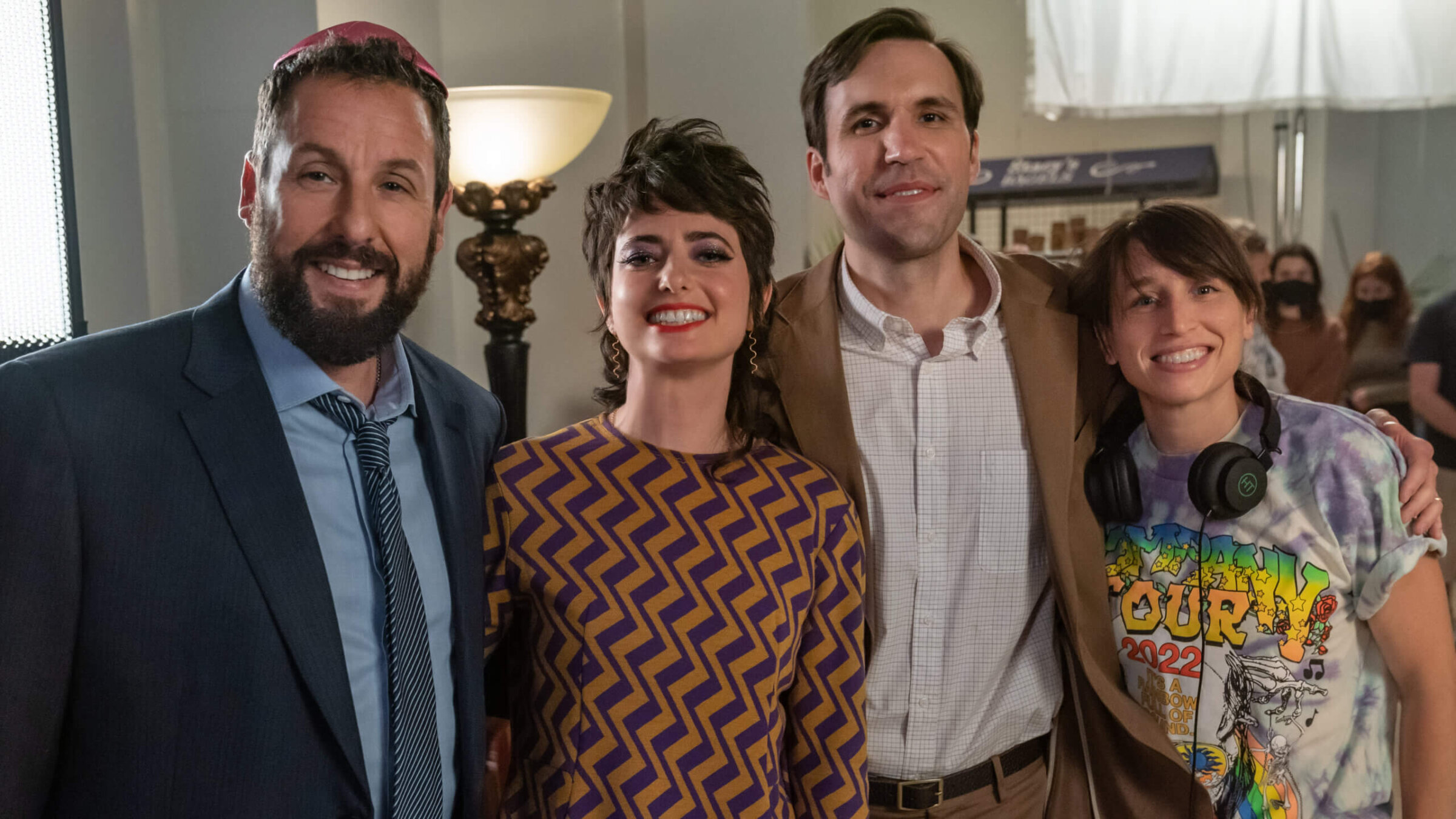‘Being queer is just as normal as turning 13’: Talking with the director of ‘You Are So Not Invited to My Bat Mitzvah’
Director Sammi Cohen talks bat mitzvah crashing and reflecting the diversity of the Jewish world

Adam Sandler, Sarah Sherman and Dan Bulla with director Sammi Cohen on the set of You Are So Not Invited to My Bat Mitzvah on Netflix. Photo by Scott Yamano/Netflix
The director of Netflix’s new coming-of-age comedy, You Are So Not Invited to My Bat Mitzvah, has a confession to make: They bowed out of their own ceremony.
“I got very nervous, and didn’t have mine when I was 13,” Sammi Cohen, 35, said in a Zoom interview. “When I went on Birthright when I was a little bit older, I did my bat mitzvah there, with two other people.”
That’s not to say Cohen is new to the simcha circuit. Growing up in the Valley in Los Angeles, they said, they attended bar and bat mitzvahs basically every weekend for six years. And even once they were in high school, and their cohort had entered Jewish adulthood, they made a habit of crashing bar and bat mitzvah parties with their best friend at the Woodland Hills Marriott.
“If family asked, we were friends, if friends asked, we were family,” Cohen said. “We did this regularly for about a year.”
Cohen went on to study film and direct for the comedy website College Humor and on TV shows like Mr. Student Body President. Their first feature, the queer high school romantic comedy Crush, debuted on Hulu last year.

When Adam Sandler was looking for a young, Jewish director to helm You Are So Not Invited to My Bat Mitzvah, which he stars in with his real-life daughters Sunny and Sadie, who play his daughters, and Idina Menzel, who plays his wife, he fixed on Cohen as having the right sensibility. (Sandler also produced the film.) The years of b’nai mitzvah experience under Cohen’s belt didn’t hurt.
The movie, which arrives on Netflix on Friday and is based on a 2005 young adult novel by Fiona Rosenbloom, tells the story of Stacy Friedman (Sunny Sandler), whose dream of a blowout bat mitzvah is thwarted by the usual middle school problems: a crush, best friend drama, and unrealistic party expectations like a private yacht on the Hudson River and a cameo by Olivia Rodrigo on a Jet Ski.
While the film includes many of the broad comedic swings you’d expect from an Adam Sandler production, Cohen also delivers a tender look at Hebrew school and the meaning of its central ritual.
Rabbi Rebecca (SNL’s Sarah Sherman) is there to remind Stacy of the significance of her haftarah — and, perhaps, the limited value of a virgin mojito bar. (Sandler nails her father’s response: “That’s why we fought the Nazis?! So you could have a mojito bar?”)
The film, with a script by Alison Peck, brings to life a suburban Reform milieu, where everyone can recognize a loving imitation of the shul’s cantor, and bubbes sigh “bubbelah” and “shayna punim” over baby photos in an entrance video. It’s a sweet portrait, even with some of the requisite Sandler gross-out humor and an outlandish Israeli DJ.
Cohen was committed to making sure their depiction of the ceremony reflected the diversity of the Jewish world. The first party we see in the film, which captures the busy b’nai mitzvah and school season over the course of a few months, is for a kid named Devin who, like Cohen, uses they/them pronouns.
“As a filmmaker, it’s my goal to normalize the Jewish experience, and normalize the queer experience,” said Cohen. “Being queer is just as normal as turning 13.”
As they sat in the room for Sunny Sandler’s actual bat mitzvah during pre-production — which, unlike Stacy’s, had a celebrity guest list that included Jennifer Aniston and Halsey — Cohen said they noticed that the crowd had grown much more diverse since their own days of gatecrashing parties to play Coke and Pepsi and dance the “Cha Cha Slide.” The cast of You Are So Not Invited to My Bat Mitzvah reflects that diversity. Stacy’s best friend, Lydia Rodriguez Katz (Samantha Lorraine), is Latina, with Luis Guzman playing her dad and Sandler’s wife, Jackie, playing her mom.
For Cohen, directing the teens sometimes felt like being a youth rabbi, and reminded them of their seven years working as a camp counselor.
“We did a lot of hanging out, talking pronouns,” said Cohen. “It was very much summer camp vibes. I want to empower these kids to go out into the world and do what they’re going to do.”
But while the film includes cram sessions on the Torah portion Ki Tisa and a whimsical rendition of the Shabbat song “Bim Bam,” Cohen is hoping the film has universal appeal.
“Part of being Jewish is learning how to exist in the world,” said Cohen. “This is our coming of age ceremony, but I think there’s global message that hopefully we go, ‘oh, yeah, we all have our thing.’”





















